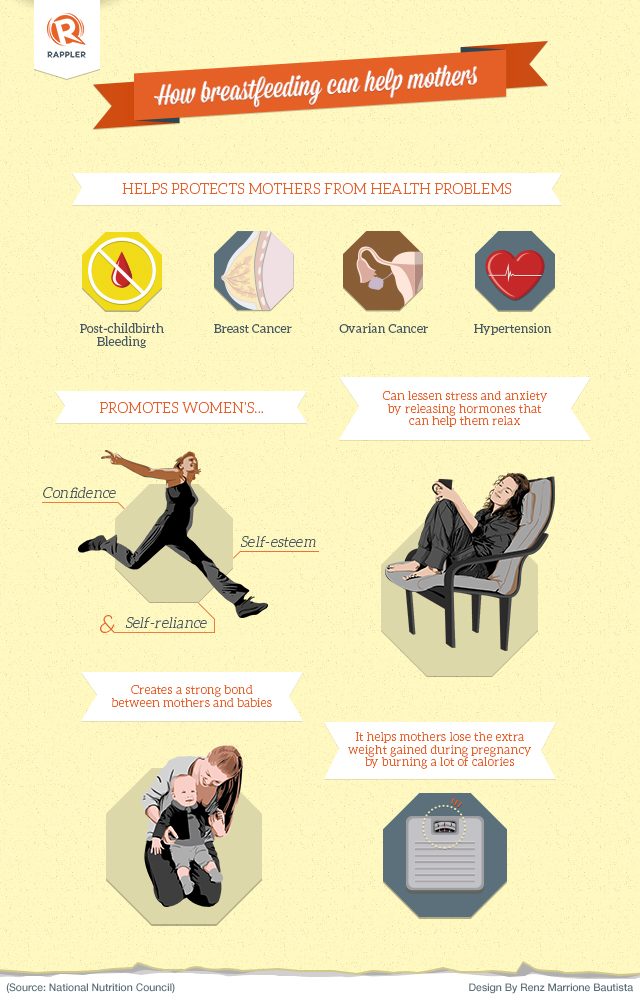SUMMARY
This is AI generated summarization, which may have errors. For context, always refer to the full article.

MANILA, Philippines – Breastfeeding has many benefits for the baby, the mother, as well as the country. This is the key message of the National Nutrition Council (NNC), the country’s top agency on nutrition, as the Philippines celebrates this year’s Breastfeeding Awareness Month.
Breastfeeding offers health benefits not only for the baby, but for the mother as well:
Breastfeeding at work
“Mothers who are breastfeeding and need to return to work can continue breastfeeding by expressing their milk and storing them in the workplace until they return home,” said Jovie Raval, NNC Chief of Nutrition Information and Education.
In fact, the Philippines has a law that protects the rights of working mothers who breastfeed. Republic Act 10028 or the “Expanded Breastfeeding Promotion Act” requires workplaces to establish lactation stations.
The law also requires employers to grant nursing mothers a “break period” so they can use the lactation stations properly.

These stations must be kept “private, clean, sanitary, and well-ventilated” at all times. Lactation stations should be separate from the toilet. The law also prohibits the promotion, marketing, and sale of instant formula within these stations.
Many mothers, however, still complain of the lack of such facilities.
Anxiety and stress are important determinants of milk flow, according to Dr Corazon Barba, UP professor and former director of the Food and Nutrition Research Institute (FNRI). Little or no breast milk will flow in the absence of oxytocin, the hormone responsible for the “milk ejection reflex.” Barba added that mothers may feel more stressed whenever their baby cries, this can then make them think that they “cannot” breastfeed.
“I empathize with the working mothers. We should advocate for conditions that will allow mothers to relax while they pump or collect breast milk in the workplace,” Barba said.
Support moms
Raval advised mothers who are having difficulties breastfeeding to seek help from community support groups. The local government units (LGUs) should ensure that such groups are accessible to all parents.
“First time mothers often think that they do not have enough milk needed. These mothers need to know that not having enough milk can be addressed through proper positioning and attachment during breastfeeding,” Raval explained. They may also take necessary medication, counseling, and lactation massages.
Raval also emphasized the importance of nutrition education, especially among young parents. “Teenage mothers being children themselves need to have proper nutrition while breastfeeding to promote their health.”
NNC called on support groups, LGUs, and employers to provide the necessary information, environment, and care so that mothers can feel confident when breastfeeding.
Formula milk

Mothers use infant formula for different reasons; some feel that they cannot produce enough milk either because of health issues or stress from work.
Barba explained that breast milk and infant formula might have little difference in terms of “nutrients” – carbohydrates, protein, fats, mineral and vitamins – since milk companies nowadays do a lot of research on human milk in efforts to make their products comparable.
She stressed, however, that “human milk contains more than nutrients that makes it the food of choice for infants. It also contains antibodies, anti-infective factors, and hormones that are not present in infant formulas. There is no question that human milk is superior than any formulation and is best for babies.”
Mothers who are seriously ill may be physically unable to breastfeed. The Department of Health, through its “Breastfeeding TSEK” campaign, said that certain illnesses – such as galactosemia, heart failure, serious kidney, liver or lung disease, and problems caused by maternal drugs – are “contraindications” of breastfeeding.
NNC, alongside breastfeeding advocates, stressed that there is no discrimination against mothers who do not breastfeed. The end goal is to make more people care about the health and needs of parents and infants.
Advocates say that instead of criticizing mothers who do not breastfeed, efforts should instead go to pushing LGUs and companies to provide the necessary support for all mothers such as sufficient maternity leaves and compensation, daycare centers or child-friendly spaces at work, lactation stations, milk banks, and access to adequate information. – Rappler.com
What are your thoughts or experiences on breastfeeding? Send your stories and ideas to move.ph@rappler.com. Be part of the #HungerProject.
You may also want to read:
What does the Milk Code mean?
Who’s violating the Milk Code?
Role of dads in breastfeeding
Overcoming breastfeeding challenges
Putting an end to ‘toasted coffee’ over breastmilk
Add a comment
How does this make you feel?
There are no comments yet. Add your comment to start the conversation.